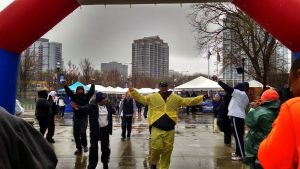Everyone knows one thing about Africa: It has its problems. Movies like “Hotel Rwanda” and “Blood Diamond” have depicted how the continent has been plagued by AIDS and wars that have decimated its population.
I walked in and sat down with a plate of cookies at a recent screening of the documentary, “The Rescue of Joseph Kony’s Child Soldiers,” produced by the Invisible Children activist group. This movie was about Uganda and opened my eyes to the implications of community.
As the movie opened with the words, “Invisible because … no records are kept of their numbers or age” and “Invisible because … their own armies deny they exist,” I quickly finished off the cookies because I knew I couldn’t get emotional with food in my mouth. As expected, the film made me want to cry out in anguish and sorrow. Was it really that good of a movie? The film prompted me, a financially struggling college student, to buy a t-shirt that I vowed to wear the crap out of as well as donate what cash I had on me.
The film revealed a single man rising to power in Uganda and leading a rebel army — the Lord’s Rebel Army (LRA) — which consists of abducted children from five countries surrounding Uganda. The LRA is made up of children as young as 5 years old. They are “abducted” (for lack of a more brutal word) from their homes and families and then indoctrinated into committing murder or, in other cases, used as sex toys. The leader of the LRA, Kony, who is now in his late 40s, surrounds himself with his wives and children, becoming virtually untouchable to outside forces.
To date, an estimated 2,000-plus residents and child soldiers have died in the conflict. To some people, statistics are simply numbers that do not register. Rather than slap in some numbers here, the important thing to realize about the statistics in this film is that the death rate is cringingly high, and the number of abductees is painfully high. It is basically genocide.
“Generations of Ugandan children have not known peace,” a mentor for Ugandan students said to the stunned crowd after the film. “If Bill Gates was killed as a child, where would you all be right now? Without the Wright brothers, many of us would not be here today either.”
The night’s atmosphere changed, however, when I went to talk to Jimmy, an LRA escapee-turned-college-bound Ugandan. The night suddenly changed from a sense of deep urgency and sadness, to extreme urgency and slight humor. As I approached, Jimmy was already in conversation with a blonde girl wearing sweats and a sweatshirt. Her head was cocked and she kept repeating, “uh-huh, uh-huh.”
Jimmy’s voice was low and gentle. I walked up to them and heard the girl say, “But, like, I don’t get it. I know he has a lot of people around him but like, at this point, can’t you just like shoot through them all to get to him?”
I looked at Jimmy, scared to see his reaction to this blatant comment. Jimmy was gracious, however, and explained generously in his soft, accented voice, “No one can kill Joseph Kony because they would have to kill children. And the children close to him do not turn against him because he is their father. Kony has become even more powerful ever since the president of Sudan has joined in supporting him.”
The girl nodded and gave some more “um hmms” and then said, “So is there, like, dancing areas in Uganda because I’m majoring in dance, and I would like really like to go there.”
Did she just say she wanted to vacation in the terrorized country of Uganda? The comment caught Jimmy and me off guard, but instead of getting angry, he laughed and said patiently that there are people and places in Uganda that are beautiful.
To differentiate myself from the slapdash comments from this girl, I asked Jimmy if he was going to continue touring with the Invisible Children roadies group after he enters college. He said he will hopefully continue raising awareness during his college years.
The girl interjected with, “College? Here at Columbia College Chicago?!”
“No…” Jimmy said smiling, “In my own country, Uganda.”
The conversation ended with Jimmy handing us fliers so we can “learn more about what the Invisible Children movement does,” because after that conversation, we obviously needed to educate ourselves. I realized how important it was to donate what I could so that I would not be just another American who watches inhumane atrocities on screen and then returns home to forget.
Later on, Jimmy said that America is the country that will save Uganda, according to Stacy Scott, who also talked to him after the screening. She is part of the Invisible Children Club at Columbia College Chicago, which hosted the event that brought the roadies of the Invisible Children. Jimmy pointed out that Europe and Asia are close to Uganda, yet the United States is the country actually donating money and calling for the salvation of the child soldiers and the demise of Joseph Kony.
At least Jimmy recognizes that not all Americans are dim-witted. To help the child soldiers and other victims in Uganda, you can donate or purchase merchandise from www.invisiblechildren.com. Also, for $35 a month you can pay for a Ugandan student’s education. This last suggestion perplexed me. Could I really shape a whole new population that shares the same values, rules and beliefs? The answer is yes. With $35 a month, one American can raise a community that values education, believes in helping others and teaches peace and not gunfire.
However, doing something for another fellow human being for the sake of being “good” does not interest many people. What I found gripping about the Invisible Children’s donation proposal was the idea that an American could help to create a civilization far away from towering skyscrapers and far away from our paper-doll society in which blatant lies dress up in suits and ties and disappointment comes wrapped in cute presents. I learned that we can help people who live far away from American soil, where green paper rectangles are dangled above a swamp of ravenous piranhas as bait for an army of hollow, blind slaves.
We can create a community unlike the useless, lazy parasites of American neighborhoods in which jobless beer bellies, 40-year-olds still living with their parents, and bunny-slippered ladies with none or too much makeup are pitied by the many Goodwill stores they slink off to. All of these stores are conveniently located on street corners hundreds of miles nearer to town than the more appropriate discarding areas of the dumps.
With our support, Ugandans could create a new society and not model itself after capitalist America, where gifts are convertibles for speeding past slums and pocket cell phones are used for communicating hate. Instead, gifts are food, family, and friends to be thankful for everyday and not just on Thanksgiving. We could have a part in creating a country in which truth shines without having to be deciphered and disentangled from doubt. We could have a role in creating a nation where what counts, what really matters is what the residents hold dear, and it is all they have — all they really need. Let’s help make a land in which people can start surviving on ships: friendships and love relationships to carry them along. We could have a part in creating something in which time is not confining, manipulative and slippery but, instead, a guiding touch on the back. Uganda could be a place where they will feel back-breaking work, and know their place, exalted in breathing in and out the oxygen they earn. It could be a land in which the volume is always turned up on everything and people feel gratitude for life.
If we helped to alter life in Uganda in this way, with just a small monthly contribution to one Ugandan student, we would perpetuate a chain of peace-minded people on another continent. We could be the builders of a generation concerned not with getting filthy rich but imbued with gratitude.










Be First to Comment